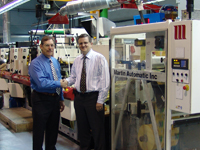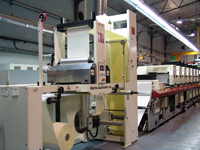Reducing Costs In The Production Environment - how investment in automated web handling can offer fast payback
Posted: March 01, 2009

Martin Automatic's Ed Pittman (left) shakes hands with Germark's Philippe Nowak after the installation of the latest automated roll handling equipment
One of the main drivers in today's print market is the need to reduce costs in the production process. With environmental issues on waste also to be taken into account, converters are under pressure from all sides to streamline their processes and maximise efficiency, yet still follow an investment policy that yields a profit margin. A veritable juggling act, one might say!
With printing presses becoming ever more sophisticated in what they can deliver at high speed, at the price of higher investment levels, shrewd converters are looking around for ancillary equipment that can boost productivity, lower production costs, and retain profit margins. Working on the principle that unnecessary substrate waste is expensive, and press downtime for roll changes even more so, not to mention the variation in print quality that it brings, one solution is a move towards continuous running.
One company that has made a special study in this field is Martin Automatic, based in Rockford, USA, IL, from where it works closely with all of the leading web press manufacturers to develop bespoke and standard web handling systems that improve production efficiency across the board from narrow web label presses to wide web machines for flexible packaging and folding cartonboard production.
Typical of Martin's collaborative work is an installation at one of Spain's leading label converters, Germark SA, where over a period of time, Martin automated MBS unwind and LRD rewind units have been installed on a new Omet press, and most recently retro-fitted to an existing MPS line. The Germark installations make an interesting study.
The company, now in its second generation of Cid family management, former FINAT President Iban succeeding his founding father German Cid, has maintained a policy of investment in the most appropriate technology at the time. The result is a production facility that includes printing presses from many of the leading manufacturers, including Gallus, Nilpeter, and Kopack, as well the Omet and MPS lines, all of whom are close cooperative partners with Martin Automatic.
With Germark's focus on premium labels for international brand leaders like Nestle, Kronenbourg, L'Oreal, and Unilever, consistent quality was essential, so the company began to investigate ways of taking as many variables out of the production process as possible. The fitting of a Martin Automatic MBS butt splicer and LRD rewinder on its Omet line pointed the way forward for Germark, and the latest addition of Martin MBSF and LRD units on one of the MPS lines has not only reduced costs, but improved overall quality too.
The need for automated roll changing became clear as Germark moved from narrow web letterpress through screen to wider web flexo processes, the Omet and MPS lines being 410 mm (16"). These wider, faster presses have large appetites for substrate, but to justify the case for investment in automated roll changing, Germark needed to consider the ROI (Return on Investment) or payback period as it is often known.
Philippe Nowak, Industrial Director at Germark explains: "We were pleased with the improvement in performance that the Martin equipment made to our older Omet line so knew there was a solid base on which to prove the case for further investment." When MPS was chosen as the preferred supplier in 2003 it was on the grounds of servo drive technology and the benefits it brought. A second MPS flexo/screen press was added in 2005, bringing colour combinations on the two presses to 9 and 10 respectively.
The investment plan for the latest Martin equipment also included the installation of a Matho waste extraction system, and moving the MPS line to accommodate the new production layout. According to Mr Nowak, this gives a potential ROI figure of 2.5 years overall, but with the Matho and press move costs deducted, a return of around 1.5 years for the Martin units seems likely.
In fact, a recent case study in the USA, where two Martin butt splicers have been installed, show a payback of 13 months, and significantly an increased throughput of 11%. Speaking for Martin Automatic, Craig Thomson stated: "It does not seem to matter whether you take the Martin predictions for ROI or those done by the customer, they are always on the low side, and the reality comes as a pleasant surprise!"
At Germark, Mr Nowak is already noticing a net production speed increase in the region of 15%, which means more splices, less waste, and an even shorter payback period. This falls inline with the company's drive to reduce waste and make its production flow more logical as part of its Japanese style ‘5S Programme' for improved productivity. Following the maxims: orderliness, order, cleanliness, visual control, and repeatability, the aim is to close-up the production processes to reduce error and increase the responsibility of the production teams. "Our aim," said Mr Nowak, "is to add quality that will allow us to retain high value business."
Clearly the policy is working. From humble beginnings in 1958, Germark has grown to employ 130 staff in its 5,500 sq m factory at Cornella de Llobregat (Barcelona), and generates an annual turnover in excess of €15m. The company maintains sales offices in Bilbao, Madrid, Malaga, and Valencia, from where it also supplies and services its range of label application and coding systems.
Independent acknowledgement of performance came in 1998 in the shape of ISO 9002 Certified Quality Assurance, and again in 2001 with ISO 14000 Certified Environmental Management System, the same year in which the company entered the Guinness Book of Records by producing the world's largest label at 100 x 29 cm.
Looking ahead, Germark sees a growth in demand for filmic substrate products such as shrink sleeves, and an increase in specialisation to meet the continued downward pressure on prices. As Mr Nowak concluded: "We can no longer afford to be all things to all people – our investment policy is focused on the higher value end of the market, where efficiency is everything."

